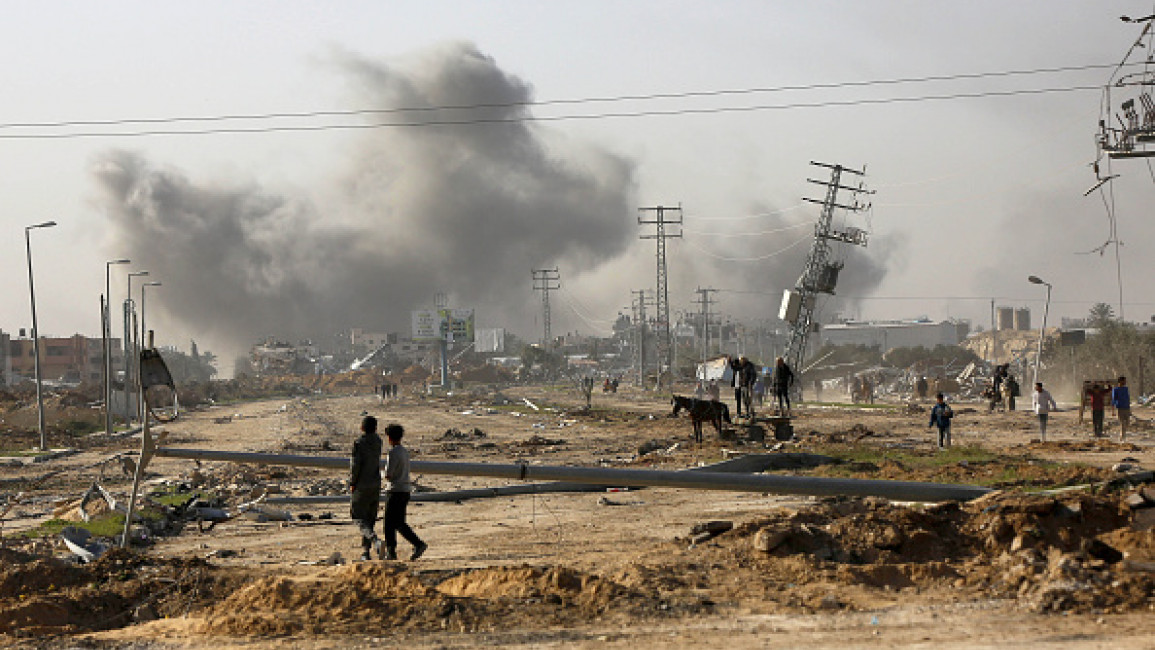UN says Gaza war 'staining humanity' on eve of 100th day
The United Nations said on Saturday the Gaza war was "staining humanity" on the eve of its 100th day as Israeli Prime Minister Benjamin Netanyahu doubled down on vows to defeat Hamas.
The conflict has unleashed a devastating humanitarian crisis in the Gaza Strip, and fears of a regional escalation intensified after US and British forces struck pro-Hamas Houthi rebels in Yemen on Friday following attacks on Red Sea shipping.
The war started on October 7, the day Hamas launched a surprise attack on southern Israel, in response to decades of blockade, aggression and occupation, the group says, resulting in about 1,140 deaths, according to Israeli figures.
Hamas also seized about 250 hostages, 132 of whom Israel says remain in Gaza.
But Israel's relentless bombardment of Gaza since then has killed above 23,800 people, mostly women and children. The unprecedented air and ground offensive has destroyed much of the enclave, and many nations believe Israel's actions lead to genocide.
An Israeli siege has sparked acute shortages of food, water, medicine and fuel in Gaza, where the health system is collapsing.
Visiting the Gaza Strip, the head of the UN agency for Palestinian refugees, Philippe Lazzarini, said "the massive death, destruction, displacement, hunger, loss and grief of the last 100 days are staining our shared humanity".
An entire generation of children in Gaza were being "traumatised", diseases were spreading and the clock is "ticking fast towards famine", he warned.
The Hague-based International Court of Justice this week heard arguments in a case launched by South Africa - and welcomed by Gazans - accusing Israel of breaching the UN Genocide Convention.
The case seeks a halt to Israel's war, which Israel claimed to the court was in self-defence and not aimed at Palestinian residents, despite the colossal death toll.
But Netanyahu insisted no court or military foe could stop Israel from achieving its aim of destroying Hamas.
International observers now await the ICJ's ruling, which symbolises a growing tide of legal scrutiny against Israel
— The New Arab (@The_NewArab) January 10, 2024
How significant is South Africa's genocide case? ⬇️https://t.co/O4gyAlYCbk
"No one will stop us - not The Hague, not the Axis of Evil and no one else," he told a televised press conference, referring to the Iran-aligned "axis of resistance" groups in Lebanon, Syria, Iraq and Yemen.
"It is possible and necessary to continue until victory and we will do it," he added, claiming most Hamas battalions in Gaza had been "eliminated".
Israel's army chief Herzi Halevi said the war in Gaza was a struggle "for our right to live here in safety", adding that the October 7 attacks would never be forgotten.
Health officials in Gaza said that Israeli strikes killed at least 60 people in the besieged territory.
Nimma al-Akhras, 80, described the strike that destroyed her home.
"It was very powerful," she said. "We started to scream and I couldn't move but someone pulled me out and put me on a cart."
At Al-Najjar hospital in southern Gaza's Rafah, mourners gathered and prayed around the bodies of slain relatives.
One man, Bassem Araf, held up a photo of a child.
"She died hungry with bread in her hand. We tried to remove the bread from her hand but it was held tight," Araf said.
"This is the resistance they are targeting in Gaza, just children."
An AFP reporter in Rafah said telecommunications had been partially restored, a day after Gaza's main operator Paltel reported the latest outage.
Paltel did not immediately confirm the service restoration but said an Israeli strike killed two of its employees in Khan Younis while they were repairing the network.
Winter rains have exacerbated the dire humanitarian situation in Gaza, where the UN estimates 1.9 million - nearly 85 percent of the population - have been displaced.
Many have sought shelter in Rafah and other southern areas where the health ministry says there isn't the infrastructure to support them.
Gaza's health ministry spokesman accused Israel of "deliberately targeting hospitals... to put them out of service," warning of "devastating repercussions".
"The idea, as always, is to drum up support for its heavy bombardment and ground invasion of Gaza to 'dismantle' Hamas and bring hostages home, and in turn, justify civilian casualties."
— The New Arab (@The_NewArab) November 6, 2023
How Israel uses social media to justify bombing hospitals in Gaza: https://t.co/an3bAiZUzz
Hospitals, protected under international humanitarian law, have repeatedly been hit by Israeli strikes in Gaza since the war erupted.
The Israeli military accuses Hamas of operating command centres in tunnels under hospitals, a charge the Palestinian group denies.
Fewer than half of Gaza's hospitals are functioning and those only partly, the World Health Organization says.
In Israel, concern grew for hostages held in Gaza as they approach their 100th day in captivity, with Netanyahu under domestic pressure to get them home.
Thousands rallied in Tel Aviv on Saturday calling for their release.
Separately, about 100 people gathered to call for an end to the war, brandishing signs saying: "Revenge is not victory" and: "No to the occupation." Minor scuffles broke out between them and government supporters.

![Trump's warm greeting to Netanyahu contrasted with Kamala Harris's critical reception [Getty]](/sites/default/files/styles/image_330x185/public/2024-07/GettyImages-2162908988.jpg?h=69f2b9d0&itok=OLc5dL88)
![The brutal assault on Khan Younis has killed dozens and displaced thousands more [Getty]](/sites/default/files/styles/image_330x185/public/2024-07/GettyImages-2162526709.jpg?h=d3eda8cf&itok=n5N-o8p5)
![Members of the Algerian delegation threw roses into the Seine [Getty]](/sites/default/files/styles/image_330x185/public/2024-07/GettyImages-2162980872.jpg?h=199d8c1f&itok=h_3o_TOL)